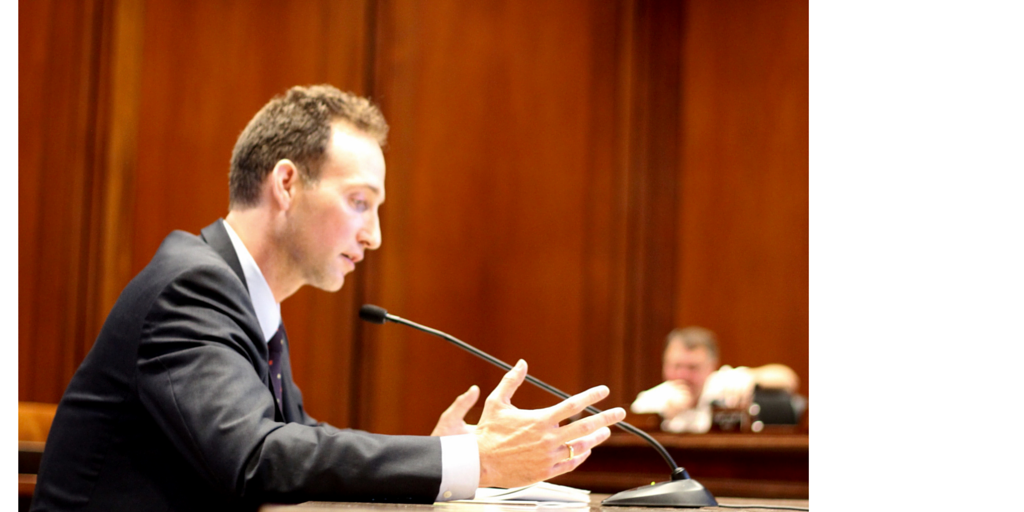TESTIMONY REGARDING H. 74
“AN ACT IMPLEMENTING THE JOINT RECOMMENDATIONS
OF THE MASSACHUSETTS CRIMINAL JUSTICE REVIEW”
PROVIDED TO THE JOINT COMMITTEE ON THE JUDICIARY
JUNE 19, 2017
Benjamin Forman
MassINC
Thank you Chairwoman Cronin, Chairman Brownsberger, and members of the committee for the opportunity to provide testimony on An Act Implementing the Joint Recommendations of the Massachusetts Criminal Justice Review on behalf of MassINC and the Massachusetts Criminal Justice Reform Coalition.
We strongly endorse the spirit of this bill and commend all of the hard work and thoughtful effort that went into shaping this package. Recidivism is a costly problem and one that we will never entirely eliminate. However, as this review made clear, we aren’t doing all that we reasonably can to reduce repeat offending. There are low-hanging fruit changes at the backend, low-hanging fruit changes to correctional practices, and low-hanging fruit changes at the frontend that could lessen the likelihood that those who come into contact with our criminal justice system commit more crimes in the future.
To the extent that this is a once in a great while process and it will be years, if not decades, before another comprehensive review occurs, we need to address all of the known vulnerabilities in our system that foster recidivism. From further limiting the use of long mandatory minimum sentences and further change to CORI practices, to addressing the costly barrier we’ve erected with fines and fees, the Committee has a lot of excellent legislation before it that together with this bill could provide comprehensive reform that achieves the greatest reduction in recidivism possible.
We appreciate how difficult it is for the committee to take on so much all at once, but we believe there is real urgency that we do as much as possible now for two reasons: First, the opiate crisis; to the extent that we’re deploying costly correctional resources to fight this scourge, we have to take the necessary steps to ensure that we’re getting maximal benefit from these expenditures. Second, to the extent that tough-on-crime policies have had disparate impact on minority neighborhoods in our urban areas, we owe it to these communities to do as much as we can to fix these problems.
I’ve testified previously about the evidence suggesting urban neighborhoods in our Commonwealth have crossed the threshold where incarceration is doing more harm than good, creating more crime rather than less.[1]This afternoon I wanted to share a bit more about why the concentration of incarceration in urban neighborhoods has become so problematic.
First, high incarceration rates have implications for access to a quality public education, which is a constitutional right in our commonwealth. The data we examined recently from the Worcester County House of Corrections show a strong relationship between neighborhood incarceration rates and the performance of neighborhood schools.[2] While performance varies considerably across Worcester’s low-incarceration rate school assignment zones, there is not a single high-performing school in the city’s high incarceration rate neighborhoods. This isn’t just a matter of correlation between poverty, incarceration, and school performance. Research shows controlling for other neighborhood and family characteristics, high levels of incarceration are harmful to schools, negatively affecting the educational achievement of all of the students in the building, even those who are not personally affected by incarceration.[3]
When we think of neighborhood health and stability, school quality is one leg. Another is civic participation. In this regard, our data from Worcester reveal another troubling trend. Voting precincts in the city with the most incarceration have the lowest voter turnout rates in municipal elections. This pattern is also consistent with research that shows residents in high incarceration rate neighborhoods disengage from civic life. High incarceration rates damage perceptions of fairness and the legitimacy of government. Incarceration also causes individuals to undervalue their own self-worth and expectations about the positive contribution that they can offer their communities. Civic engagement is largely transmitted to children by their parents. So when formerly incarcerated individuals do not vote or otherwise engage in civic life, there are lasting generational consequences.[4] This is especially problematic for Gateway Cities like Worcester, which have very modest resources for community and economic development and depend largely on residents to engage in local improvement efforts.
Raising the age to 21 and working to positively steer young adults in a different direction is the kind of bold front-end policy change that we could move on now to help our urban communities overcome the legacy of well-intended, but ultimately harmfully ineffective, tough-on-crime era practices.
In keeping with this legislature’s long tradition of fighting for equitable opportunity with forward-thinking leadership, the Massachusetts version of Justice Reinvestment must also be about the communities most impacted by tough-on-crime policies. As you weigh this bill and complementary legislation, we urge you to keep these communities and the ideas you hear from them in testimony today foremost in your minds.
[1] Todd Clear and others. “Predicting Crime through Incarceration: The Impact of Rates of Prison Cycling on Rates of Crime in Communities.” Final Report to the National Institute of Justice. (Washington, DC: U.S. Department of Justice, 2014).
[2] Benjamin Forman and Lindiwe Rennert. “The Geography of Incarceration in a Gateway City: The Cost and Consequences of High Incarceration Rate Neighborhoods in Worcester” (Boston, MA: MassINC, Forthcoming).
[3] Joseph Murray and others. “Children’s Antisocial Behavior, Mental Health, Drug Use, and Educational Performance after Parental Incarceration: A Systematic Review and Meta-Analysis” (2012).
[4] Hedwig Lee and others. “Consequences of Family Member Incarceration: Impacts on Civic Participation and Perceptions of the Legitimacy and Fairness of Government” The ANNALS of the American Academy of Political and Social Science 651.1 (2014); Traci Burch. “Effects of Imprisonment and Community Supervision on Neighborhood Political Participation in North Carolina” The ANNALS of the American Academy of Political and Social Science 651.1 (2014); Vesla Weaver and Amy Lerman. “Political Consequences of the Carceral State” American Political Science Review 104.04 (2010).
